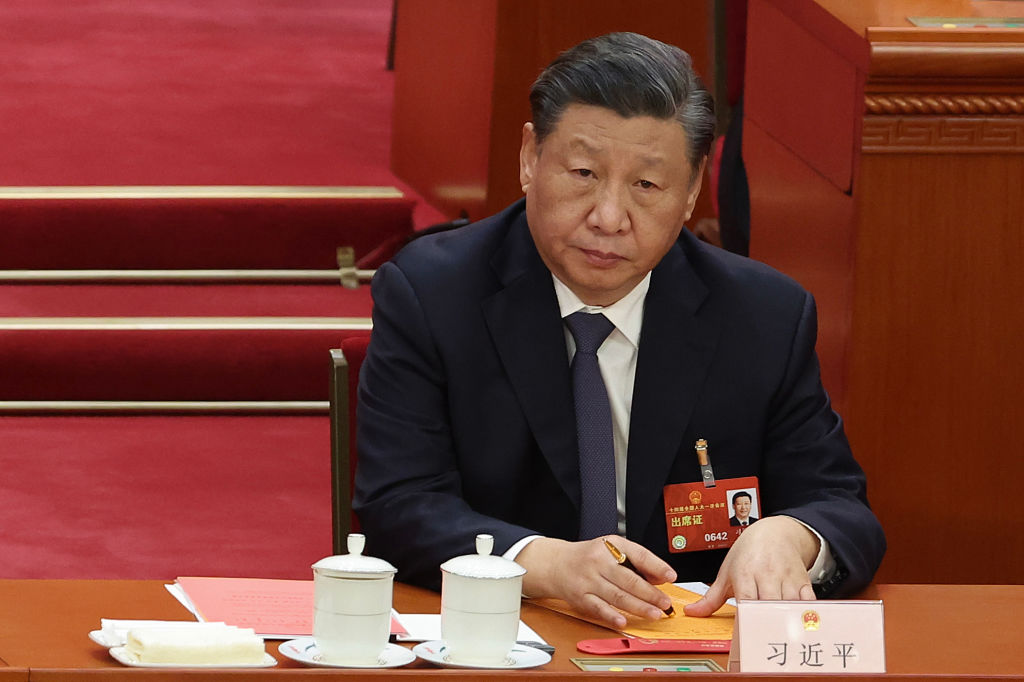
President Xi Jinping will host the leaders of two heavily indebted nations for state visits to China this weekend, as he skips the world’s premier forum for top-level diplomacy in India.
Zambian President Hakainde Hichilema will visit China from Sept. 10-16, while Venezuela’s Nicolás Maduro will arrive on Friday for a seven-day trip, the Foreign Ministry in Beijing said in separate statements.
The symbolism of Xi’s decision to host two world leaders as he snubs the Group of Twenty summit sends a clear message about how he prefers to conduct diplomacy: The Chinese leader is increasingly receiving dignitaries on home soil, or turning to groups where Beijing has more clout, such as the newly expanded BRICS.
Read More: The G20 Summit Is an Opportunity for Modi and a Test of India’s Global Leadership
Zambia and Venezuela have sought economic relief from China in recent years as they struggle to service mountains of debt, a significant portion of which is owed to Beijing. President Joe Biden plans to push for debt relief for poor countries and announce funding for infrastructure projects at the G20 summit this weekend.
While Zambia and Venezuela are a central part of the global conversation on debt, neither is a G20 member. The grouping has agreed to grant permanent membership to the African Union, Bloomberg News reported Thursday, a move that would give Zambia some opportunity for participation at future summits.
Maduro’s visit to the world’s second-largest economy comes as China and Venezuela are re-establishing connections after years of cooling ties, and against a backdrop of intensifying Washington-Beijing rivalry. A meeting with Xi would mark the first time the two leaders have sat down in five years.
Raising Money
China became a key lender to Venezuela in 2007, when it first provided funds for infrastructure and oil projects under late President Hugo Chávez. Now, Maduro’s government is seeking to raise more money from Venezuela’s massive oil wealth before his expected bid for a third presidential term.
Biden is also seeking to engage Venezuelan officials in talks about lifting sanctions in exchange for allowing fair elections next year. After Venezuela defaulted on $60 billion of international market debt in 2017, it was unable to engage with bondholders due to economic sanctions preventing U.S. investors from dealing with the Maduro government.
Read More: How China Became a Global Lender of Last Resort
China’s stance on participating in debt restructuring negotiations has become increasingly important given its role as the largest creditor for many poor nations.
Zambia became the first country to win major debt relief through the so-called Common Framework earlier this year. China’s central role in that deal to restructure $6.3 billion in bilateral debt set a template for how coordination between its government, the Paris Club and bondholders can work.
That milestone was only a deal in principle, and Hichilema’s government has yet to sign a memorandum of understanding allowing it to reach individual agreements with each lender. Formalizing that deal should also remove a hurdle to striking agreements with commercial creditors, including holders of $3 billion in eurobonds.
Growing Importance
Earlier this month, the International Monetary Fund’s chief, Kristalina Georgieva, said the organization had a “strong partnership” with China during a visit.
Zambia’s global importance is growing, given its vast deposits of minerals critical for the energy transition. Africa’s second-biggest copper producer, its also home to what will be the continent’s biggest nickel mine and has cobalt resources.
That’s placed it at the center of a struggle for influence between China and the west as governments try secure access to metals that are forecast to be in short supply over the next decade. At least one Chinese company — Zijin Mining Group Co. — is bidding to take a stake in Zambia’s Mopani Copper Mines Plc assets that the government took over from Glencore Plc in 2021 via a majority state-owned investment company.
Hichilema, who’s making his first trip to China, may also pursue talks on the revival of the Tanzania-Zambia railway line that links its copper mining region to the port of Dar es Salaam. The line — built by China in the 1970s — has fallen into disrepair and runs at about 10% of design capacity.
Simultaneous Scenarios
As Xi hosts world leaders at home, his Premier Li Qiang will represent China at the G20 summit in New Delhi. The White House said Biden doesn’t intend to meet with Li during the summit, and Xi’s absence will likely aggravate Beijing’s already rocky relationship with the forum’s host, India.
Biden, meanwhile, is scheduled to have a bilateral meeting with Indian Prime Minister Narendra Modi in the Indian capital on Friday evening, according to a statement from the White House.
Read More: What Does the ‘Global South’ Actually Mean?
Xi’s next major international event now looks to be the third Belt and Road Initiative forum in Beijing next month. More than 90 countries have confirmed that they will attend, Chinese Foreign Ministry spokeswoman Mao Ning told reporters at a regular press briefing on Thursday, without providing details.
So far, only one world leader is confirmed to attend the event: Russian President Vladimir Putin, who will make his first trip abroad since a warrant for his arrest on alleged war crimes was issued by the International Criminal Court.
—With assistance from Fran Wang, Taonga Mitimingi and Matthew Hill.
More Must-Reads from TIME
- Cybersecurity Experts Are Sounding the Alarm on DOGE
- Meet the 2025 Women of the Year
- The Harsh Truth About Disability Inclusion
- Why Do More Young Adults Have Cancer?
- Colman Domingo Leads With Radical Love
- How to Get Better at Doing Things Alone
- Michelle Zauner Stares Down the Darkness
Contact us at letters@time.com